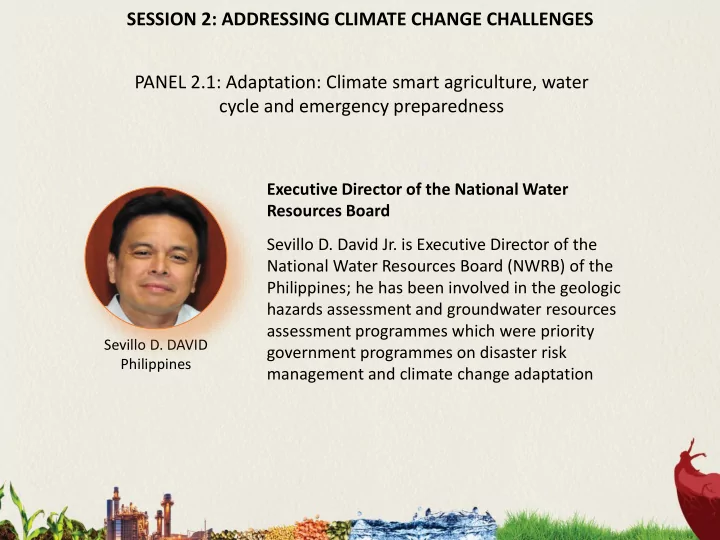

SESSION 2: ADDRESSING CLIMATE CHANGE CHALLENGES PANEL 2.1: Adaptation: Climate smart agriculture, water cycle and emergency preparedness Executive Director of the National Water Resources Board Sevillo D. David Jr. is Executive Director of the National Water Resources Board (NWRB) of the Philippines; he has been involved in the geologic hazards assessment and groundwater resources assessment programmes which were priority Sevillo D. DAVID government programmes on disaster risk Philippines management and climate change adaptation
National Water Resou rces Board DR. SEVILLO D. DAVID, JR. Executive Director National Water Resources Board PHILIPPINES
* Hydrological data gaps (limited hydrological data, data not continuously collected, lack of system for data storage, data archiving and data analysis) * Limited knowledge on groundwater resources assessment ( use of modeling tools, groundwater vulnerability assessment, recharge calculation) * Impact of climate change on the groundwater recharge - variation of groundwater recharge affects water quality and seasonal water availability that could lead to water shortage - Quantitative estimate of recharge rates and determination of the recharge zones
National Water Resou rces Board Drafting and finalization of the report “ Investment Needs for Resource Assessment Capability in the Philippines to improve the Planning and Management of Water Infrastructure ”
Remedies being implemented National Water Resou rces within the IWAVE Project Board funded through IAEA Technical Contracts 1) Surface training participated by DPWH- CO, DPWH nationwide, NWRB) 2) Recharge Training participated by MGB Regions 2 and 10, WDs of Regions 2 and 10, PNRI, LWUA) 3) Groundwater Resource Vulnerability Assessment - Field work conducted in Regions 2 and 10 collecting water quality of well, isotope data and rainfall data - Stakeholders consultation in CDO and in Tuguegarao, Kalinga Apayao and Mt. Province
Remedies being implemented National Water Resou rces within the IWAVE Project Board funded through IAEA Technical Contracts 4) Water Use Inventory – Region 2 Groundwater Vulnerability Assessment using DRASTIC Method for Regions 2 and 10 Conduct of Isotope Technique in Vienna (MGB Reg 2, NWRB and PNRI) 5) Conduct of Isotope Technique (WDs in Regions 2 and 10, MGB in Regions 2 and 10 , NWRB, PNRI) 6) Conduct of Training on Groundwater Modeling in Vienna (NWRB, MGB Region 2 and 10) 7) Conduct of Isotope Training in Vienna (NWRB, PNRI and MGB Region 2)
Remedies being implemented National Water Resou rces within the IWAVE Project Board funded through IAEA Technical Contracts 8) Conduct of Network in India- (NWRB,PAGASA) 9) Hydrological Information Sharing Program (HISP) conducted remotely and face to face training in Delft (MGB, LWUA, PAGASA, NWRB)
National BENEFITS: Water Resou rces Board 1. The workshops and trainings provided by IAEA were used by NWRB in the conduct of water resources assessments. 2. The equipment provided by IAEA enabled NWRB to collect data and store water sample for isotope analysis. 3. The experts provided NWRB proper techniques on data sampling, collection procedure, proper handling and interpretation
National BENEFITS: Water Resou rces Board 4. The groundwater resources assessment results in the critical areas is a robust tool for formulating policy in water stressed areas and will aid NWRB in the regulation of water users. 5. The isotopic analysis and nuclear applications of hydrology on water resources provided by the technical experts of IAEA improved the management of Philippines water resources through use of scientific tools as basis for policy making.
National BENEFITS: Water Resou rces Board 6. The isotope analysis contributed to the determination of recharge areas/zones that could be exploited as source of water supply or could be protected. 7. The amount of calculated recharge through isotope technique will be the basis for groundwater regulation. 8. The projected recharge rates from rainfall can be validated using recharge rates from isotope analysis.
THANK YOU!! NATIONAL WATER RESOURCES BOARD 8th Floor, NIA Building, EDSA, Quezon City, Philippines Telefax Nos. 02-9202641 /02- 9202654 /02-9202724 Website: www.nwrb.gov.ph Email add: nwrbphil@gmail.com
Recommend
More recommend